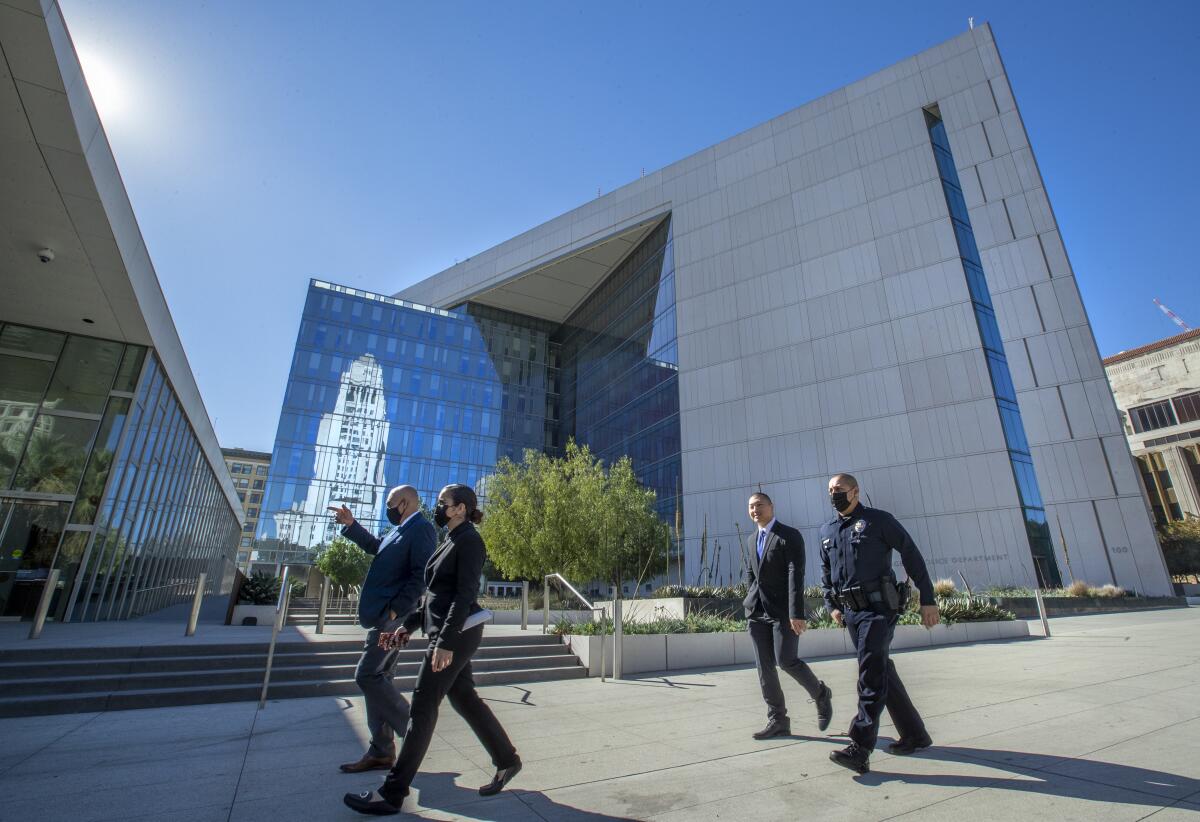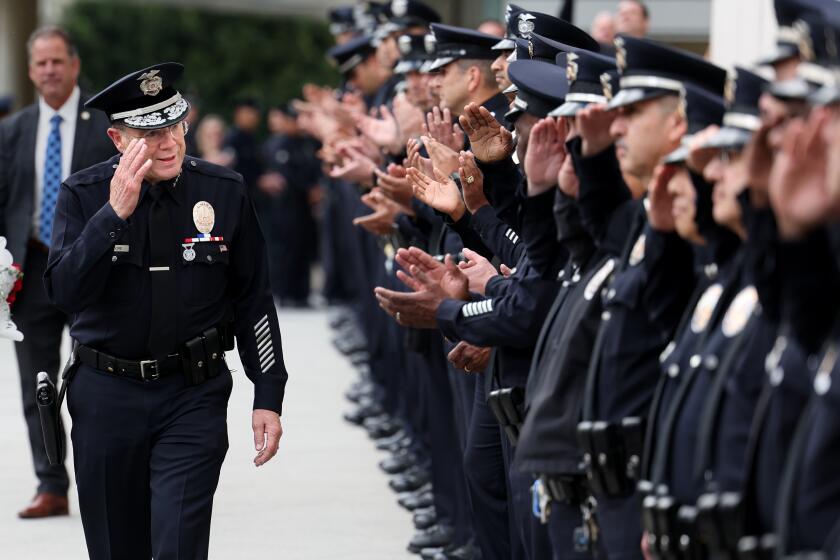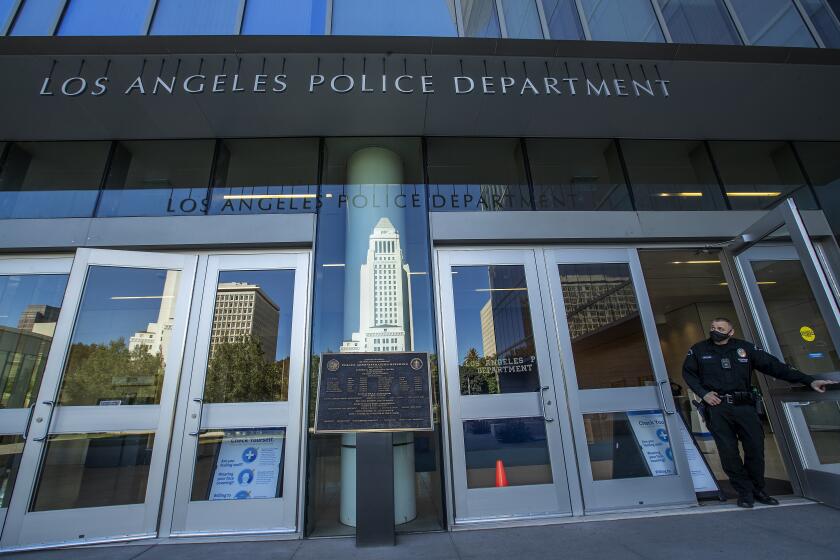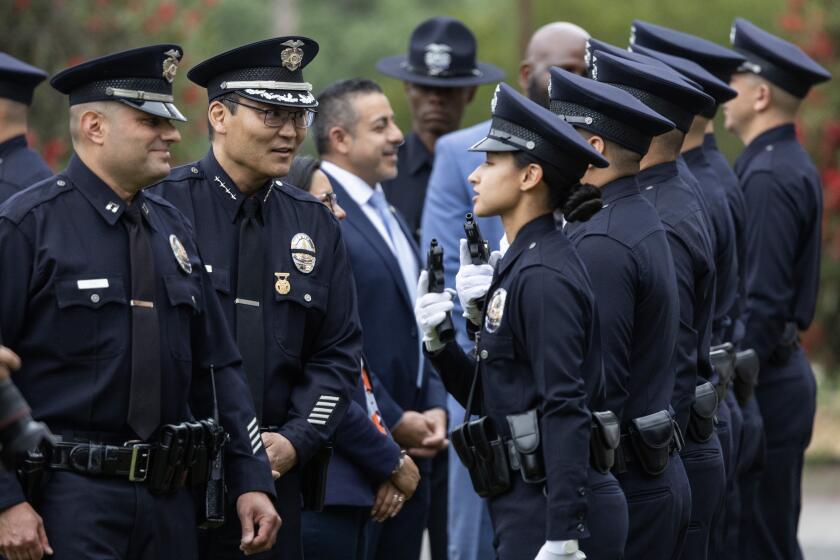Ballot measure to rework LAPD officer discipline system clears City Council

- Share via
The Los Angeles City Council on Tuesday approved a ballot measure that would give the police chief the authority to fire officers outright for certain serious misconduct, but stops short of the broader overhaul of the LAPD’s discipline system that some were pushing for.
The council voted 11 to 2 to send the proposal to voters on the Nov. 5 ballot, with Hugo Soto-Martínez and Councilmember Eunisses Hernandez opposed.
The vote included some eleventh-hour drama as critics argued that the plan would in effect create a two-tier system of officer discipline that will allow the immediate termination of some — but not all — problem officers by the chief.
In addition to concentrating more power in the chief’s hands, the proposal advanced by the council would do away with the option for officers to have their disciplinary cases reviewed exclusively by civilians, who tend to be lenient in meting out punishments. The proposal would allow an officer to file an appeal of their termination, which would then go to a new system of binding arbitration.
Under the proposal, sponsored by Councilmember Tim McOsker, the LAPD chief would have the power to terminate officers who act dishonestly, belong to a law enforcement gang, refuse to cooperate in a misconduct investigation or engage in physical abuse, sexual assault or various types of discrimination, among other misconduct.
Currently, officers found guilty of such misconduct can keep their jobs even after facing a disciplinary panel, a system that LAPD officials have said is unusual and allows problem cops to remain on the force.
In recent weeks, Soto-Martínez criticized the ballot proposal for allowing the use of binding arbitration for officers who appeal their terminations or suspensions, pointing to studies and testimony from city and police leaders nationwide that show the process usually favors the accused employees.
Soto-Martínez also argued that the McOsker plan bore little resemblance to the proposal first introduced nearly 16 months ago — or even to an earlier proposal that was passed by the council’s public safety committee. He warned the changes would do little to move the needle on police accountability, and instead make the discipline process “even more complicated.”
“It’s going to create more issues,” he said.
McOsker pushed back on that notion, saying the measure would in fact reduce ambiguity.
“What this language does is give us greater clarity, not less clarity. Because now we know the list of things” that can trigger an officer’s immediate firing by a chief, he said.
Councilmembers Marqueece Harris-Dawson and Kevin de León were absent from Tuesday’s vote. Because the vote was not unanimous, the proposal will need a second vote next week, which is considered a formality.
Before 2017, so-called boards of rights were composed of two sworn command staff members of the LAPD and one civilian.
In recent years, officers facing termination or lengthy suspensions have had the option of choosing all-civilian disciplinary panels, which they have since used almost exclusively, according to LAPD data. The council proposal calls for panels with one commanding officer and two civilians.
With the deadline for getting the measure on the Nov. 5 ballot looming, Tuesday’s meeting was a point of no return for ushering through changes to the department’s system for getting rid of bad cops.
Soto-Martínez and some senior LAPD officials worry that limiting fireable offenses will undermine a chief’s ability to get rid of officers who have violated public trust. Officers would be allowed to appeal their terminations, just like many other public employees.
The LAPD has had only two outsiders serve as chief in its modern history, but there is a growing push to bring in a third.
The Los Angeles Police Protective League, which represents rank-and-file officers, said the ballot language “strikes the right balance,” preserving a civilian majority on the LAPD’s disciplinary panels while ensuring that officers who are terminated by the chief have access to an appeal process with binding arbitration.
Before clashing in recent weeks, McOsker and Soto-Martínez had teamed up on the LAPD reform effort. They seemed an odd pairing, with Soto-Martínez having campaigned as a critic of police spending and McOsker previously serving as an attorney for the Police Protective League.
By Tuesday, Soto-Martínez voted against the final ballot language, saying it created too much ambiguity.
“I cannot as a responsible legislator come here and allow this,” he said.
The LAPD’s much-maligned disciplinary system is on the verge of a major transformation. Members of the Police Commission don’t want to be left out.
Speaking to council members, LAPD Deputy Chief Michael Rimkunas warned that the proposal as written would prevent the direct termination of an employee who is willfully insubordinate, such as refusing to comply with a condition of employment. It would also prevent the outright firing of someone who has lost their ability to be a peace officer on the basis of being found mentally ill or barred from possessing firearms, he said.
As the Police Commission continues its citywide listening tour to hear about what residents want to see in the department’s next leader, many of the stops have seen a low turnout.
“The amendment would create two different systems for similar types of misconduct, leading to confusion and inconsistent disciplinary outcomes,” Rimkunas said.
Pete White, founder and executive director of the advocacy group Los Angeles Community Action Network, said the department’s disciplinary system “has always been broken.”
The boards of rights tend to include attorneys, judges and some former police officials, not those “on the receiving end of police violence,” he said.
“So there was never any confusion for us on the ground that those weren’t quote-unquote civilians that represented victims of police violence.”
At the same time, the prominent LAPD critic said he was wary of concentrating too much power into the hands of LAPD leaders who historically haven’t always shown a willingness to punish problem officers.
“It was more like this system needs a complete overhaul, versus the tinkering,” White said.
More to Read
Sign up for Essential California
The most important California stories and recommendations in your inbox every morning.
You may occasionally receive promotional content from the Los Angeles Times.















